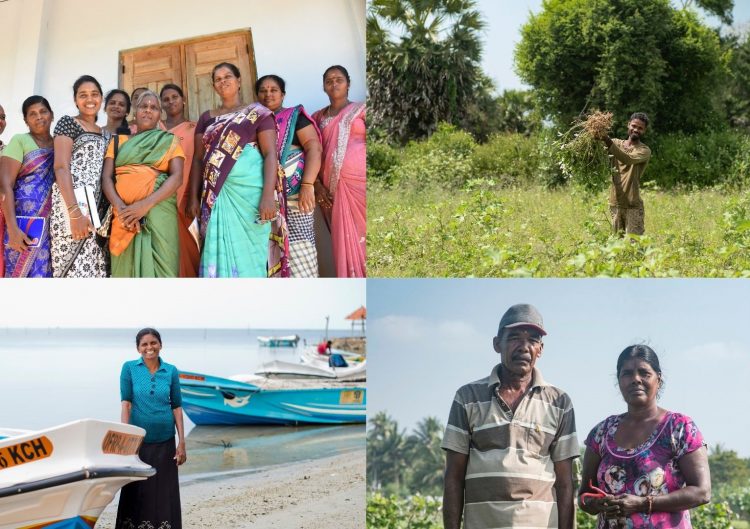June, 1, 2023

Findings and Insights generated as a result of the LEED+ Project
International Labour Organization (ILO), successfully conducted a two-day knowledge forum, based on its flagship Local Empowerment through Economic Development and Reconciliation (LEED+) project. Implemented in several districts in the Northern Province, the LEED+ project is nearing its closure after two successful phases, the first of which was initiated in 2011.
This Knowledge Forum is a culmination of the project’s 12-year journey of creating inclusive and sustainable decent work opportunities for rural communities. The project also has a strong focus on vulnerable groups, including women and persons with disabilities.
A part of the ILO’s Global Jobs for Peace and Resilience programme, LEED+ is supported by the Australian Government Department of Foreign Affairs and Trade (DFAT), and the Government of Norway. The project was implemented in collaboration with national and sub-national government stakeholders, private sector, as well as grassroots entities.
‘The LEED+ program has directly benefitted more than 43,000 families over the past 12 years providing skills and knowledge to foster business growth and generate sustainable income,’ Australian High Commission Sri Lanka, First Secretary, Development Cooperation, Erika Seymour said.
‘Despite the passage of more than a decade since the conclusion of the civil war, the lasting repercussions continue to affect communities in the Northern Province. Thus, it is crucial for collaborative efforts between the public and private sectors to support these communities and promote development in these regions. The LEED+ project has played a significant role in equipping individuals from these communities with valuable skills, empowering them in their pursuits, and facilitating the attraction of private sector investments’. Commented Royal Norwegian Embassy Sri Lanka, First Secretary/Deputy Head of Mission, Hilde Berg Hansen.
As a result of the 30-year civil conflict, the Northern Province of Sri Lanka, which is home to over a million people, has encountered unique obstacles in achieving socio-economic progress and advancement. With unemployment and poverty rates higher than the national average and the highest share of households in poverty, the Northern Province is among Sri Lanka’s poorest regions. Towards addressing this, in its first phase the LEED project utilized a strategy of revitalizing the northern cooperative sector, alongside connecting small-scale farmers and fishers in the region with businesses from across Sri Lanka. Building on the lessons and success from phase one, in its second phase LEED+ placed greater focus on facilitating partnerships in select agriculture and fisheries value chains. Generating economic incentives for both producers and investors on equal terms, the resulting win-win situations have seen companies expanding their footprint, and setting-up of processing centres in the North, thereby creating further employment opportunities.
As the LEED+ project enters its last year of operation, it aims to implement exit strategies that involve institutionalizing successful models to ensure their continued expansion even after the project concludes. By embracing the LEED+ approach and inclusive business models, the project has fostered public-private partnerships to stimulate promising value chains, ultimately contributing to the long-term employment, productivity, and economic growth of rural communities. Through collaborations with the private sector, the project has identified potential value chains relevant to the region, paving the way for increased investments in the Northern Province.
Simrin Singh, Director of ILO Country Office for Sri Lanka and the Maldives stated ‘For over a decade, the LEED and LEED+ project has implemented strategies centered on improving livelihoods and job creation. The project has remained agile, innovative, and grounded on the realities of the region. Its success, in capacitating the Cooperatives, and creating links between producers in the North and the private sector, has delivered short term wins, but also presented long-term solutions. By creating an eco-system of necessary support services, knowledge inputs, and market linkages, decent work opportunities for women and men will continue to be generated. Essentially, the ILO’s role has been to plant the seed, facilitating and building opportunities that connect businesses to communities, so that everyone can share the gains of growth and ultimately no one is left behind.’
Based on the well tested solutions from over a decade of LEED and LEED+ implementation in the Northern Province, the ILO has made a clear human centered, economic and business case for development policies that prioritize addressing regional disparities, and adaptable approaches tailored to the distinct requirements of various sectors and regions.
Photo Caption- ‘LEED+ has empowered over 43,000 Families, creating sustainable and inclusive livelihoods in the Northern Province’
Video Story